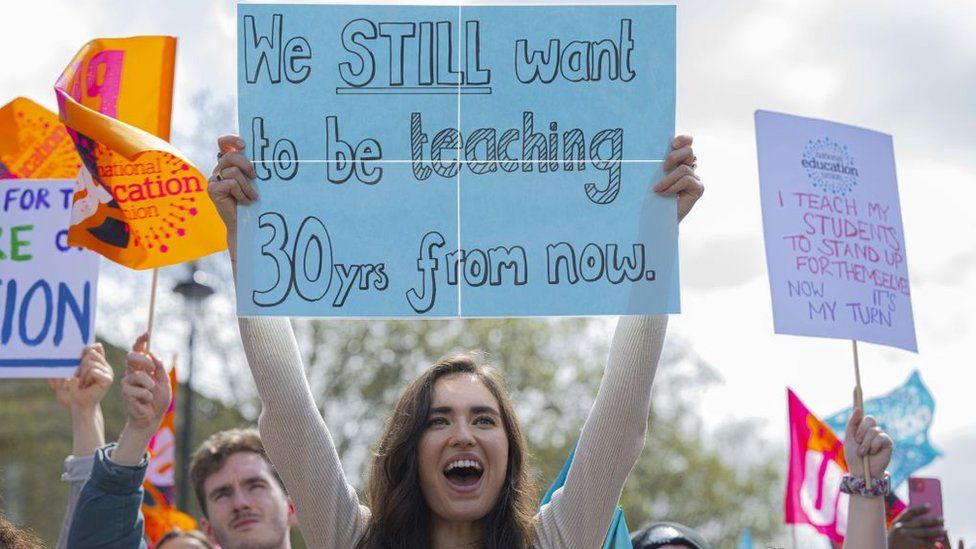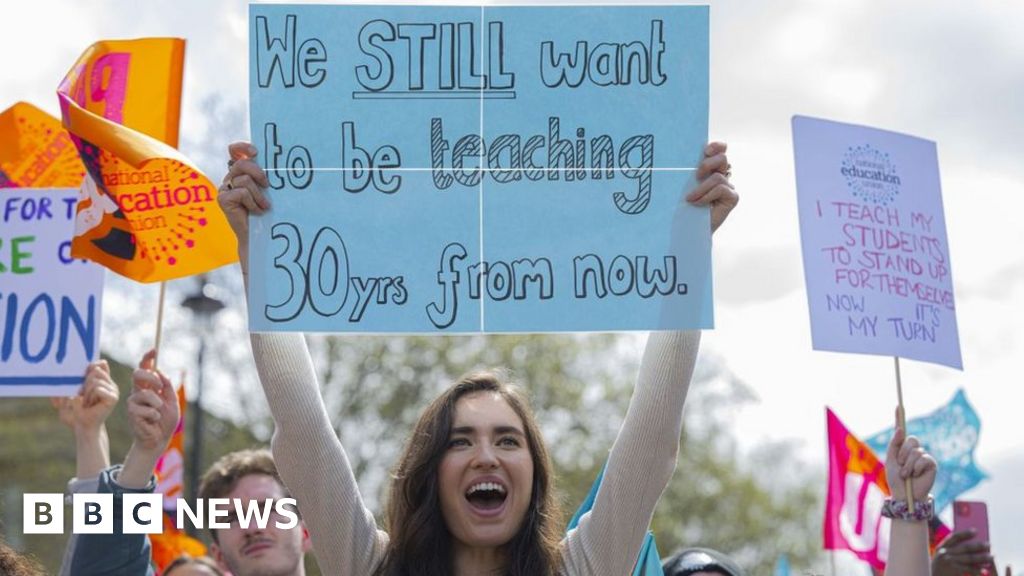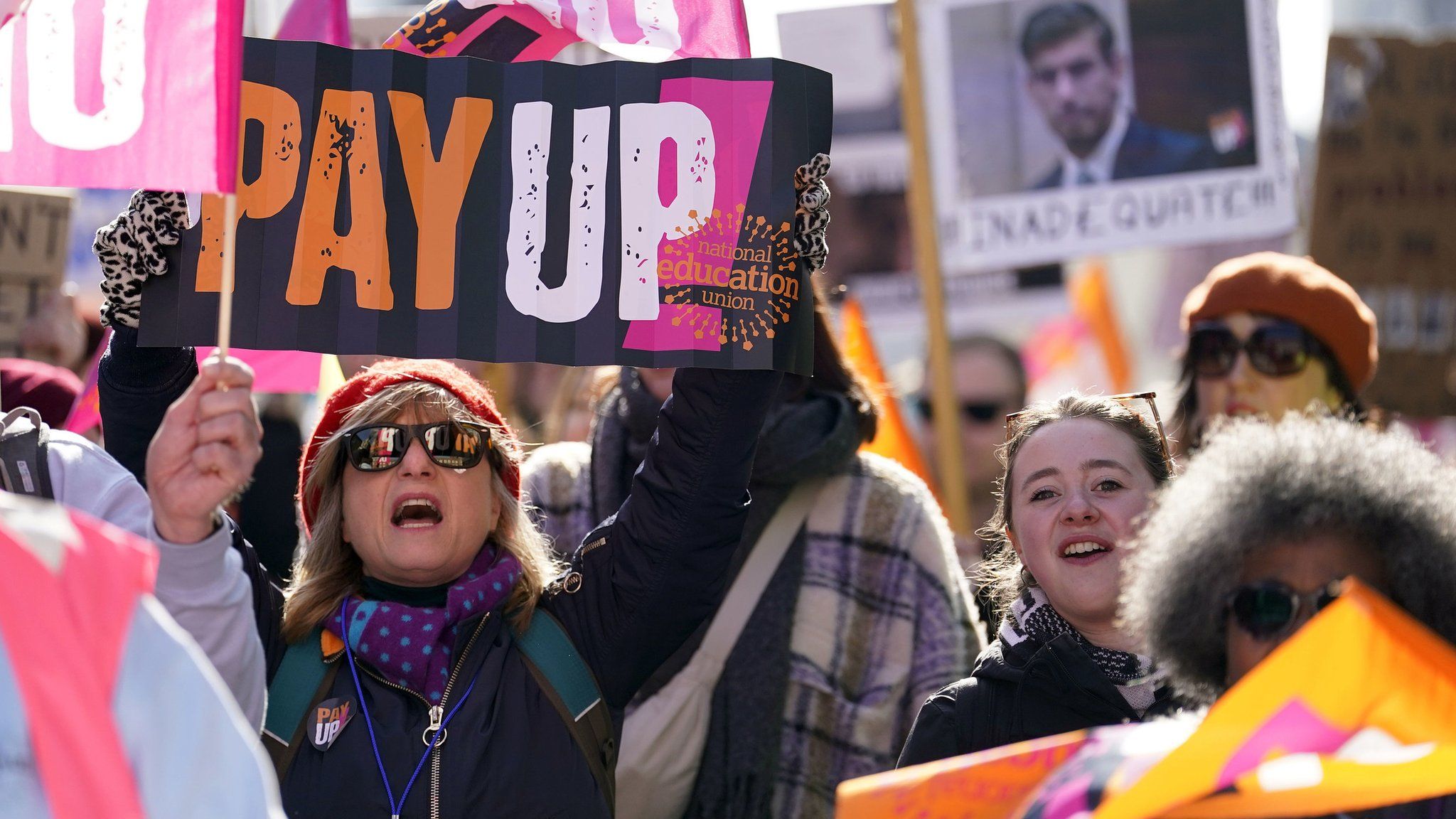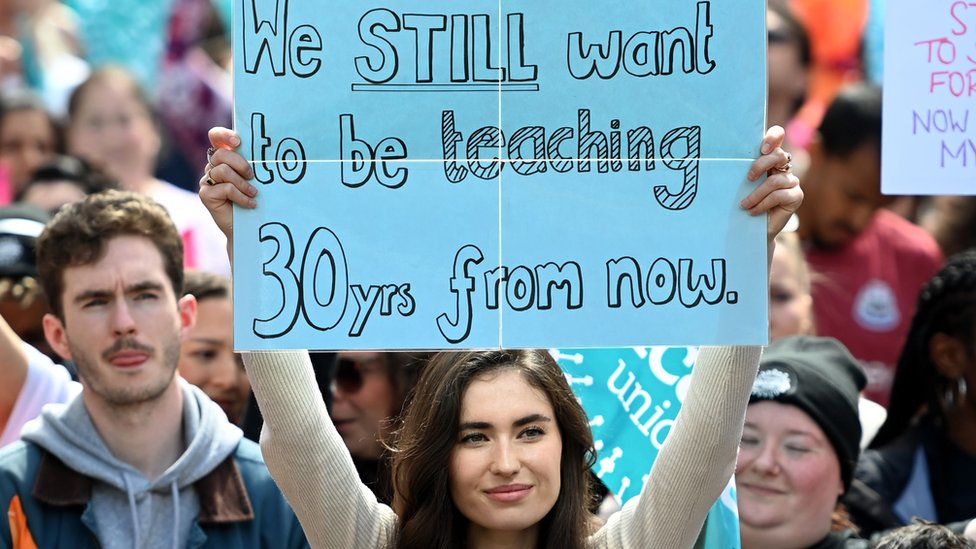
Teachers in England will strike over pay again on two dates in July, the National Education Union (NEU) has announced.
National strikes are scheduled for 5 and 7 July. Many schools are likely to fully or partially close.
The NEU is calling for negotiations with the government to start again and says strike action is a “last resort”.
The Department for Education said further strike action would cause “real damage” to pupil learning.
Education Secretary Gillian Keegan has previously said strike action was “extremely disappointing”.
There have already been five national and three regional strike days since February by members of the NEU, which is UK’s largest education union.
The most recent one, on 2 May, affected more schools than ever – with fewer than half of schools (45.3%) fully open.
Dr Mary Bousted and Kevin Courtney, the NEU’s joint general secretaries, said the education secretary had “turned her back” on teachers in England.
They called for Ms Keegan to get round the negotiation table, saying their calls have time and again “fallen on stony ground”.
It is within her power to halt these strikes, added Dr Bousted and Mr Courtney in a joint statement.
Most state school teachers in England had a 5% pay rise for the year 2022-23. The government also offered a £1,000 one-off cash payment which was lost when talks failed.
Unions want the offer to be higher to match inflation, and for any pay rise to be funded by extra money from the government rather than from schools’ existing budgets.
The government has offered a 4.3% pay rise for most teachers for 2023-24 with starting salaries reaching £30,000.
The Department for Education described it as a “fair and reasonable offer” and said that schools would receive an extra £2.3bn over the next two years.
It said on average across England, the offer is fully funded. This refers to the national picture and each school will be affected differently.
However, talks stalled after all four unions rejected the government’s offer, saying most schools would have to make cuts elsewhere to afford it.
They are calling on the government to publish the recommendations of the independent pay review body, which advises what pay rise teachers should be offered for next year.
‘I’ll lose money’
Oldfield Primary School in Chester has partially closed on previous strike days, and will do the same for the July strikes.
Head teacher Alan Brown says the last thing teachers want to do is strike as their students have already missed education because of the pandemic.
But he says the dispute is about “the future of these children” and “not just about teachers’ pay”.
“This is about funding for schools,” he says.
“We have seen a decrease in the amount of funding available for us. We do get more money in our budget, don’t get me wrong, but to run a school, it costs a lot more money and something needs to happen to actually get us back in sync.”
In Leeds, business owner Virginia Nnomo has three children who all had to stay at home on previous strike days. She is weighing up the cost of childcare and whether it is worth opening her salon for the upcoming strikes.

“The cost of a babysitter is a lot of money and she charges me per child, so when I weigh it up, maybe it is better to stay home – but I will lose money, that’s for sure,” Virginia says.
Kate, a doctor at the local hospital, had to take time off work when her seven-year-old daughter’s primary school closed on previous strike days. But she says she is fully supportive of the teachers.
“They don’t get paid enough money in my opinion so I am quite happy to jiggle things around so we can support them,” she says, adding that she hopes the dispute is resolved soon.
Three other teaching unions, the NAHT, the NASUWT, and the Association of School and College Leaders (ASCL), are also balloting members on strike action for the autumn term.
The four unions say they would co-ordinate that action to maximise disruption – which the government has said is “unreasonable”.
Elsewhere in the UK, teachers in Northern Ireland, and NAHT members in Wales, are continuing to take action short of a strike. In Scotland, the pay dispute has ended following a revised pay offer from the Scottish government.
A Department for Education spokesman said the strike would cause disruption for parents across the country.
“Thousands of schools are receiving significant additional funding as part of the extra £2bn of investment we are providing for both 2023/24 and 2024/25, which will take school funding to its highest level in history next year, as measured by the IFS (Institute for Fiscal Studies think tank).”
As is normal process the School Teachers’ Review Body has submitted its recommendations to the government on pay for 2023/24, said the spokesman, adding it would consider the recommendations and publish “in the usual way”.
Related Topics
-
-
2 hours ago

-


